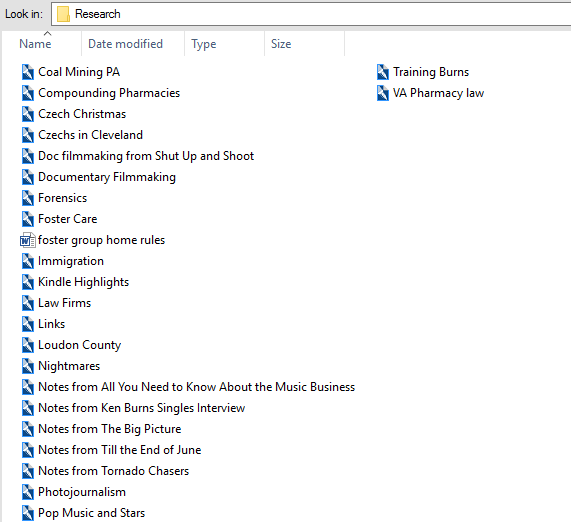Researching a Novel: Accurate But Vague
 I’ve spent the past week diligently researching a novel. Not just any novel, but The Swallow’s Nest, my work in progress which is now entering the home stretch.
I’ve spent the past week diligently researching a novel. Not just any novel, but The Swallow’s Nest, my work in progress which is now entering the home stretch.
It may seem odd to you that in the home stretch of my novel, I’m still doing research. You might ask yourself why, um. . . is she finally getting around to it now? I mean, don’t you think she’d have done it before she wrote the first sentence?
Yes. Well, good news. I did. In fact I’ve been knee-deep in research since this idea occurred to me.
 Can you stand a quick digression? When I originally came up with this story, I said, “no way.” In fact I shook my unconscious and demanded it join hands with my little gray cells for an exorcism.
Can you stand a quick digression? When I originally came up with this story, I said, “no way.” In fact I shook my unconscious and demanded it join hands with my little gray cells for an exorcism.
The one thing I had promised myself? I would not, under any circumstances, write another research-heavy novel. I had just finished When We Were Sisters, and while it may not look research heavy to you? Take a look at some of the files I created as I worked on the story.
These are a sampling of folders that contain information from multiple sources. This doesn’t include the hundred or more websites I bookmarked and went back to multiple times.
While I received a very moving email this weekend from a former foster child who found it surprising that someone who hadn’t been a foster child got the facts straight, I wasn’t a foster child and I’ve never been a foster parent–at least not officially. I had to depend on books, the internet, and the kindness of strangers and friends.
I live for emails like that one.
When I began scratching around for a new idea I realized that this time, I needed something simpler, a story I could throw myself into without sacrificing weeks or even months.
Instead, I came up with The Swallow’s Nest, set in California–where I have not lived for many decades–and heavily immersed in California child custody law. (Sorry, but those are the only tidbits I’m feeding you today.)
For me, researching a novel has three distinct phases:
- Checking facts and digging just deeply enough to be sure a new idea is feasible. For instance, if I decide I want to write a story about a parakeet who escapes its cage on a cross-country trip (don’t look for that book any time soon) I would have to research parakeets, their life span, how far they can fly on an average day, their predators, how weather would affect the flight. Once I was satisfied I might pull it off, I could plot the story or move on to something else.
- Once an idea is approved or decided on, in-depth research to develop plot and character begins. Where was the parakeet’s family traveling? For what purpose? What kind of jobs do the owners have? What’s their story and does it involve issues, for instance homelessness or divorce law? Once I’m sure I know enough to start, I do just that. Often I discover plot or character ideas I can use in the novel. That’s why I don’t use a researcher.
- While I need to be sure an idea will work, I rarely know for sure what specifics I’ll need until I write my way toward them. The most intense research occurs as the novel is being written. I look for details to make a story come alive and I target the particulars.
When making use of research, I try to be accurate but vague. I can’t be an expert on everything. So I need to really know the basics and at least a few shiny details. If I have serious questions about the way something works, I need concrete, well-researched answers. But an elementary school library might have everything I need.
Exceptions persist, however. I spent most of this past week tearing out my hair. I had done weeks of research on child custody law in California. I had faithfully copied every statute. I had made lists of how things developed. The truth is, that after all that work, I was still so confused, I knew I couldn’t proceed.
I had two choices–three if you count giving up on the book. I could wing it. I could continue losing sleep. Or I could bite the bullet and look for an expert who would talk to me, in this case a California lawyer specializing in family law.
Taking the third option I went to newsgroups I belong to and asked for referrals. Then I asked professional friends, family and readers for suggestions. In the end, four great contacts stepped up, but while each was helpful, none were California attorneys. So I did the unthinkable. I went online and looked for family law attorneys in the county where my novel takes place. And I sent emails to complete strangers.
I am delighted to say one of them bore fruit. I found the nicest, most helpful, most knowledgeable attorney who took more than an hour with me, answered every question, made suggestions, and helped me make sense of all the research I had done to that point. No lawyer jokes in my presence, please.
Talk about the kindness of strangers? But more good news. Every time I’ve asked strangers for help on any book, somebody has stepped forward.
Will my book be better because at least I tried my best to get the facts right? You decide. Next week let’s discuss my new favorite TV show, This Is Us, and different choices they’ve made. Until then.
I am reading While We Were Sisters now and love it.
(Still hoping for more Goddess books. I am not a foster child, I came for a loving home, nor have I ever known anyone in the foster system. But, as little as I know about foster care, this book seems realistic. Glad you did your research. (Smiling) Can’t wait to read your new book when it is published. I too like This is Us.
I was sorry to leave the Goddesses hanging, but publishers make those decisions. I do think Samantha’s story needs to be told. Maybe someday.
It is the authenticity of your writing that speaks to me. When I read an Emilie Richards book I feel that I am learning on at least 2 levels – 1. I learn about the topic be it quilting, or pearling or the foster care system. 2. I learn something about myself because I am able to empathize with the characters. I trust that the characters are true in every sense of the word and I usually identify closely with one or two of them.
I just realized that I never feel the need to shout at the book pages – “Don’t do that! What are you thinking?!?!?” I know the characters and while they are not predictable, their actions ring true and plausible. If they do something I would not do, I understand why they took that course.
Can’t wait to read Swallow’s Nest.
Thank you so much, Penny. I love the way you broke this down.
I would imagine the majority of readers are unaware of research authors must do to make their manuscript authentic, but you do an awesome job, and I appreciate all your hard work. Keep those great reads coming!
Always learn and enjoy your blogs! Thank you! I don’t watch TV any more and when I did it was awards and musical. Your show sounds interesting!
It is wonderful that you are so thorough when you are researching for you novels. Attention to detail makes everything more believable and keeps us thinking.
Emilie,
Your research paid off! “When We Were Sisters” is very believable! I think this novel further champions the cause of foster children everywhere while at the same time being a really good fiction book!
Kathy Dean
I am so glad you liked it, Kathy. This next week I’ll talk more about how to straddle that line between fiction and facts.
I am a mother of two natural children, AND two adopted children, And a mother with failed adoptions of two more. I am not an expert on all children in foster care, but I can attest to what my adopted children went through, and what cause the two failed adoptions.
So I can tell you, that YOU definitely NAILED it.
I have loved your books since first stumbling across Prospect Street. After reading it I searched for all prior books, and watched faithfully for each new book as it was released. I love each and every one of them.
Keep on writing as you do it right!
Thank you so much, Holly. I’m an adoptive and biological parent, too. My daughter came to us from India, so obviously a lot was different. But I was part of a group of adoptive parents and I heard a boatload of stories. I guess we can say that was personal research. Thank you so much for your kind words on my writing.